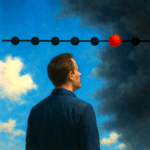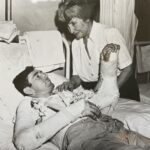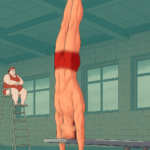Finding a Lump
If the funeral director gave you ten dots—just ten—to distribute on the timeline of your life—to demarcate the key moments of your existence—where would you place your dots?
If you denoted your birth and death, you’d be down to eight. One dot for your wedding day? Seven left. Births of two children? Five down, five to go. Death of your parents, lumped together since dots are few? Four left. Mid-life crisis with job change and relocation? Three. Spiritual transformation, perhaps a baptism? Two. Death of your partner of fifty years? One. Discovery of your own cancer? Hmm. Should you spend your final dot on such an accursed thing?
I found a testicular mass today. Something had been enlarging for months, but I thought it was just my varicocele, a collection of distended veins in the scrotum that I’ve had since the 1980s. Varicoceles can worsen with heavy exertion, and I lift weights. This year the swelling doubled in size, became stony and painful, then kept on growing. I’ll request an ultrasound and some lab tests. Hopefully, it’s nothing—just my suspicious mind imagining the worst. But if a patient of mine said to me about this very problem, “Doc, what do you really think? Is it cancer?” I would tell him, “I don’t know. It could go either way.”
Testicular cancer most often strikes boys and men between sixteen and forty-five. I’m beyond that youthful window, but it’s America. Cancer varieties arch across the sky like a rainbow, some varieties extremely treatable, but others less so.
As a family doc, I participate daily in cancer care. On a bad day, I might diagnose two or three new cancers back-to-back.
One man comes to see me, and everything seems fine. His sports team is winning, he just got promoted at work, and a three-day weekend beckons. On exam, I notice a mass. I discuss it calmly, then order labs and imaging. The next day, I consult urgently with high-powered specialists and place a huge new dot into his medical record.
A woman makes an appointment with me in the office accompanied by her family. She’s lost weight, and she’s glad about it. But her family’s not happy, and they report what they see. “She falls often and bruises terribly. She screams from her back pain.” Or, “Don’t you agree her voice is raspy? She’s choking on bread. Yesterday, she coughed up blood.”
You’ve heard it said, “He who has himself for a doctor has a fool for a patient and an even bigger fool for a doctor.” There’s truth beneath the wit, though it’s impossible to escape being our own physician initially. Who could notice the new lumps in our bodies sooner than we, ourselves?
I’m probably still better at practicing medicine than at writing stories. But I grow weary of all the death; I long to transmit to others what I’ve learned about life.
So I write about suffering—that seems to be my niche—but hopefully about overcoming as well. Nothing pleases me more than helping others find purpose through their hardship. Within community, our suffering becomes purposeful if it presses us to love one another and discern what matters most.
I’m writing about this lump, partly because that’s what writers do, but also to facilitate communication between generations. Are there fathers and sons reading this post between sixteen and forty-five? Could you discuss monitoring for testicular cancer between yourselves?
Whether my tests come back normal or not, I’ll let you know. If I have cancer and need orchiectomy and chemotherapy, I’ll supply some grist for discussion on mortality, making treatment decisions, growing through trials, and finding the new normal.
Three Days Later
Do you wonder how your thinking will change after you receive a new, life-altering diagnosis? As I await my ultrasound, I consider the possibility of having testicular cancer—seminoma vs. non-seminoma, metastatic vs. localized—and I investigate my treatment options. Fibromyalgia feels like having the flu forever with no reason and no solution. I feel physically terrible and mentally immobilized. A cancer diagnosis might explain my misery in a more satisfying way than my never-ending chronic disease.
Chemotherapy for testicular cancer consists of nine weeks of three agents: cisplatin, etoposide, and bleomycin. Each has its own long list of side effects, some temporary, like profound nausea, and some chronic, like nerve injury. If my ultrasound were to show a tumor, if I scheduled an orchiectomy promptly, and if I started chemo the next week, what would that mean? How would that impact my family and my schedule? Could I continue working as a family doctor while undergoing chemo? Or would I be at too much risk of infection? Or too fatigued? Or too mentally obtunded to make correct decisions for the hard cases?
What if I only had a few days left of relatively clear thinking? How would I use my mind if this was as sharp as my mind might ever be again?
I’m revising the second book in my fantasy series set in the Stone Age. At the start of each chapter, I include a song or proverb ostensibly written by one of my protagonists. Writing those lyrics requires a clever mind. The writer’s brain makes connections based on sound and feeling that defy understanding. I’d like to finish those clever songs, if possible, in case I never have the chance to do it well again.
Four Hours Later
The ultrasonographer took great care to avoid hurting me, and the radiologist reviewed the images immediately. What a country! What an era we live in! There were only three findings: one moderate simple hydrocele; one eight mm epididymal cyst; and multiple bilateral non-specific calcifications. No cancer.
Thank God.
Does our mind play tricks on us? Yes. Was the workup unnecessary? No. This abnormal physical finding warranted investigation. But how do we know when to take aggressive action? Whenever a cancer is found, we always wonder if it might have been found sooner.
I do not have cancer. Just fibromyalgia. And a benign lump. I acted promptly when I found my new problem, and I hope my readers will do the same.
Please consider subscribing to my newsletter!
I need to expand to an audience of 10,000 readers!
If you liked this post, please send it to a friend. If the reading audience grows, agents and publishers become suddenly far more keen on joining in the Adventures of TAT!
Copy URL to Clipboard





